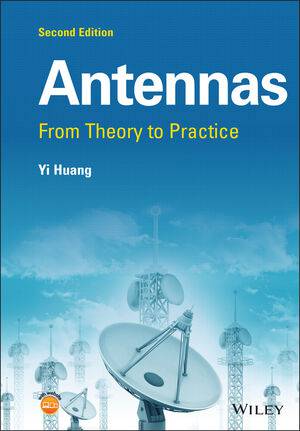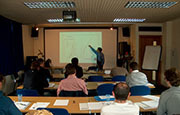Speaker
Antenna Systems Architect,
Qualcomm
Kevin R. Boyle received a B.Sc. (Hons.) in Electrical and Electronic Engineering from City University, London in 1989, a M.Sc. (with distinction) in Microwaves and Optoelectronics from University College, London in 1997 and the Doctor of Technology degree from Delft University of Technology in 2004.
He was with Marconi Communications Systems Ltd., Chelmsford, England until to 1997, working on all aspects of antenna system design. He joined Philips Research Laboratories, Redhill, England in 1997 (which became NXP Semiconductors Research in 2006) where he was a Principal Research Scientist and a Project Leader for antenna and propagation related activities.
In 2008 he joined EPCOS working as an Antenna Systems Architect. His areas of interest include antenna design for mobile communication systems, adaptive RF systems, diversity, propagation modelling and related areas of mobile system design. He now works at Qualcomm.
Dr. Boyle has actively participated in COST 259 and COST 273, is a member of the IEE and a Chartered Engineer. He has published more than twenty papers in refereed international journals and conferences, has contributed to two books and holds fifteen patents.
Speaker
Professor of Wireless Engineering
BSc (Wuhan), MSc (Nanjing), DPhil (Oxford), FIEEE, FIET, CEng
Department of Electrical Engineering & Electronics
University of Liverpool
Prof Yi Huang received BSc in Physics (Wuhan, China), MSc (Eng) in Microwave Engineering (Nanjing, China), and DPhil in Communications from the University of Oxford, UK in 1994. He has been conducting research in the areas of antennas, radio propagation, applied electromagnetics, radar, wireless communications, and energy harvesting since 1987. His experience includes 3 years with NRIET (China) as a Radar Engineer and various periods with the Universities of Birmingham, Oxford, and Essex as a member of research staff. He worked as a Research Fellow at British Telecom Labs in 1994 and then joined the Department of Electrical Engineering & Electronics, the University of Liverpool as a Lecturer in 1995, where he is now a Chair in Wireless Engineering, Deputy Head of Department, and Head of High-Frequency Engineering Research Group.
Dr Huang has published over 500 refereed papers in leading international journals and conference proceedings and authored books on Antennas: from Theory to Practice (John Wiley, 2008, and 2021) and Reverberation Chambers (Wiley 2016, and 2019). He has received over 10 awards (e.g. the IET Premium Award 2022 for Best Paper, EuCAP2023 Best Antenna Paper, the IET Innovation Award 2018, and BAE Systems Chairman's Award 2017) and many research grants from research councils, government agencies, charities, the EU, and industry, acted as a consultant to various companies, and served on a number of national and international technical committees (such as the IET, EPSRC, European ACE, COST-IC0603, and COST-IC1102, and EurAAP) and been an Editor, Associate Editor or Guest Editor of four of international journals (including IEEE AWPL 2016-2022). He has been a keynote/invited speaker and organiser of many international conferences and workshops (e.g. EuCAP2018, IEEE iWAT, WiCom, and LAPC). He is at present the Editor-in-Chief of Wireless Engineering and Technology, Associate Editor of IEEE Trans on Antennas and Propagation, a College member of EPSRC, the UK/Ireland Delegate to EurAAP (2016-2020, 2022-2024), a Fellow of IEEE (FIEEE), a member of IEEE AP-S New Technology Directions Committee, a Distinguished Lecturer of IEEE AP-S (2022-date), and Senior Fellow of Higher Education Academy (SFHEA).


